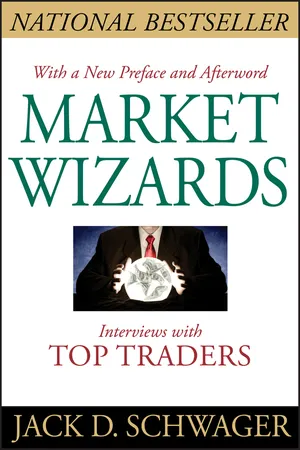
- English
- ePUB (mobile friendly)
- Available on iOS & Android
About this book
The world's top trader's reveal the secrets of their phenomenal success!
How do the world's most successful traders amass tens, hundreds of millions of dollars a year? Are they masters of an occult knowledge, lucky winners in a random market lottery, natural-born virtuosi—Mozarts of the markets? In search of an answer, bestselling author Jack D. Schwager interviewed dozens of top traders across most financial markets. While their responses differed in the details, all of them could be boiled down to the same essential formula: solid methodology + proper mental attitude = trading success. In Market Wizards Schwager lets you hear, in their own words, what those super-traders had to say about their unprecedented successes, and he distils their responses down into a set of guiding principles you can use to become a trading star in your own right.
- Features interviews with superstar money-makers including Bruce Kovner, Richard Dennis, Paul Tudor Jones, Michel Steinhardt, Ed Seykota, Marty Schwartz, Tom Baldwin, and more
- Tells the true stories behind sensational trading coups, including the one about the trader who turned $30, 000 into $80 million, the hedge fund manager who's averaged 30% returns every year for the past twenty-one years, and the T-bond futures trader who parlayed $25, 000 into $2 billion in a single day!
"Market Wizards is one of the most fascinating books ever written about Wall Street. A few of the 'Wizards' are my friends—and Jack Schwager has nailed their modus operandi on the head."
--Martin W. Zweig, Ph.D., Editor, The Zweig Forecast
Frequently asked questions
- Essential is ideal for learners and professionals who enjoy exploring a wide range of subjects. Access the Essential Library with 800,000+ trusted titles and best-sellers across business, personal growth, and the humanities. Includes unlimited reading time and Standard Read Aloud voice.
- Complete: Perfect for advanced learners and researchers needing full, unrestricted access. Unlock 1.4M+ books across hundreds of subjects, including academic and specialized titles. The Complete Plan also includes advanced features like Premium Read Aloud and Research Assistant.
Please note we cannot support devices running on iOS 13 and Android 7 or earlier. Learn more about using the app.
Information
Part I
FUTURES AND CURRENCIES
Taking the Mystery Out of Futures
- Standardized contracts—Futures contracts are standardized (in terms of quantity and quality); thus, the trader does not have to find a specific buyer or seller in order to initiate or liquidate a position.
- Liquidity—All of the major futures markets provide excellent liquidity.
- Ease of going short—The futures markets allow equal ease of going short as well as long. For example, the short seller in the stock market (who is actually borrowing stock to sell) must wait for an uptick before initiating a position; no such restriction exists in the futures markets.
- Leverage—The futures markets offer tremendous leverage. Roughly speaking, initial margin requirements are usually equal to 5 to 10 percent of the contract value. (The use of the term margin in the futures market is unfortunate because it leads to tremendous confusion with the concept of margins in stocks. In the futures markets, margins do not imply partial payments, since no actual physical transaction occurs until the expiration date; rather, margins are basically good-faith deposits.) Although high leverage is one of the attributes of futures markets for traders, it should be emphasized that leverage is a two-edged sword. The undisciplined use of leverage is the single most important reason why most traders lose money in the futures markets. In general, futures prices are no more volatile than the underlying cash prices or, for that matter, many stocks. The high-risk reputation of futures is largely a consequence of the leverage factor.
- Low transaction costs—Futures markets provide very low transaction costs. For example, it is far less expensive for a stock portfolio manager to reduce market exposure by selling the equivalent dollar amount of stock index futures contracts than by selling individual stocks.
- Ease of offset—A futures position can be offset at any time during market hours, providing prices are not locked at limit-up or limit-down. (Some futures markets specify daily maximum price changes. In cases in which free market forces would normally seek an equilibrium price outside the range of boundaries implied by price limits, the market will simply move to the limit and virtually cease to trade.)
- Guaranteed by exchange—The futures trader does not have to be concerned about the financial stability of the person on the other side of the trade. All futures transactions are guaranteed by the clearinghouse of the exchange.
Table of contents
- Cover
- Table of contents
- Preface to the Paperback Edition
- Preface
- Part I: FUTURES AND CURRENCIES
- Part II: MOSTLY STOCKS
- Part III: A LITTLE BIT OF EVERYTHING
- Part IV: THE VIEW FROM THE FLOOR
- Part V: THE PSYCHOLOGY OF TRADING
- Final Word
- What I Believe 22 Years Later
- Appendix 1: Program Trading and Portfolio Insurance
- Appendix 2: Options—Understanding the Basics
- Glossary
- EXCERPT: Edward Thorp
- End User License Agreement